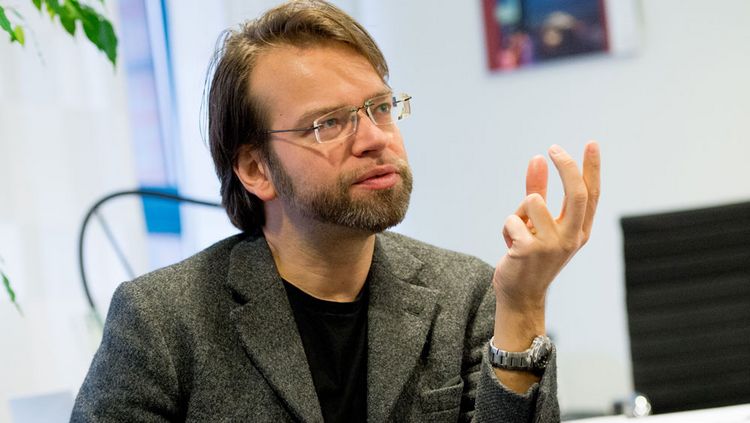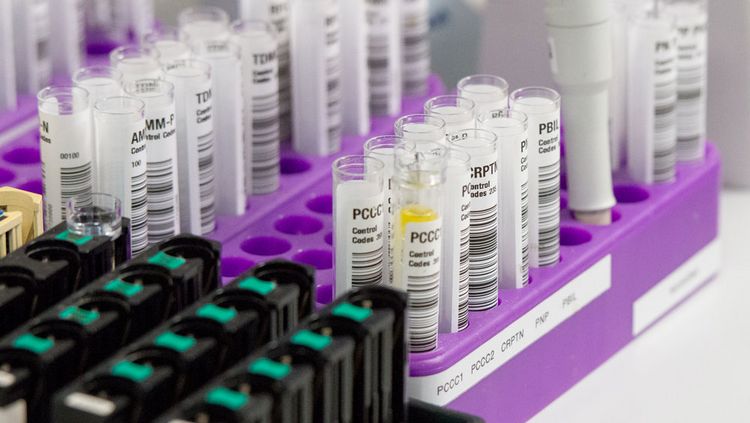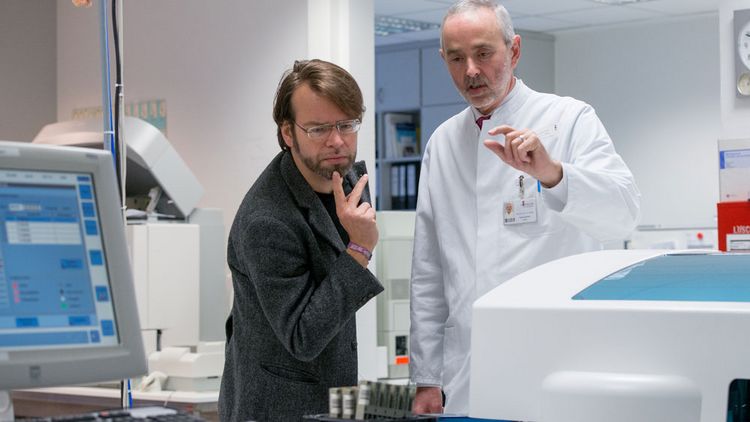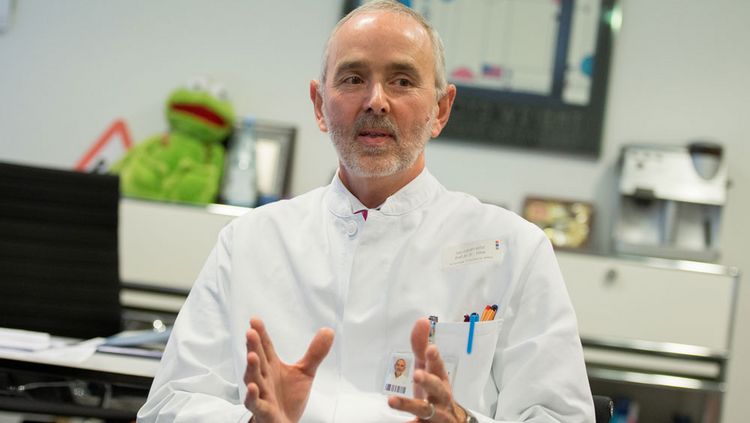Infectious diseases from a medical and a cultural history perspective: An interview with medical specialist and chemist Klaus Peter Kohse and contemporary historian Malte Thießen.
QUESTION: Professor Kohse, the situation seems to be calming down somewhat in some countries of West Africa, the U.S. is free of Ebola again, and in Europe too, we haven't heard anything about infections. Can we relax?
KOHSE: Ebola is far from having run its course in West Africa. There are still plenty of new infections, there are still deaths, and this will go on for some time yet. However the likelihood of it spreading in Europe or the US is very small.
QUESTION: And cases like that of the nurse who was infected while taking care of a missionary who had been brought back to Spain?
KOHSE: These are isolated cases of such infections; you can count them on one hand. Take the following comparison: there were 3000 cases of new infections with HIV in Germany last year. 3000! – we're talking about an entirely different figure here! There are 20 million HIV patients worldwide. So the cases of Ebola are very tragic and also highly dangerous, but I don't see a threat in epidemiological terms.
QUESTION: To what extent would you say public perception truly reflects the seriousness of the various diseases and the threat they pose?
KOHSE: There is indeed an imbalance here. Naturally when people are dying of Ebola in Africa and the number of deaths is increasing, it deserves the media’s attention. That goes without saying. But it must be seen in relative terms. Not just through comparisons with the millions of Aids patients, but also with the millions of children who die of diarrhoeic diseases in the Third World. We're talking about far higher numbers – as tragic as this Ebola outbreak is, and as difficult as it is to combat in Africa. Or compare it with influenza, the ordinary flu: every year flu causes hundreds of deaths in Germany alone!
Differing "Attention Windows" and Threat Scenarios
QUESTION: Professor Thießen, you recently published a volume on the history of epidemics in the 20th century. How does this different perception arise?
THIESSEN: It's important and interesting to see when an "attention window" for epidemics opens. And indeed, the example of Aids highlights how epidemics have to be associable with current fears or plans to actually become a topic of public interest. Aids became a huge topic as soon as it broke out, even though HIV infections were far outnumbered by common flu deaths at the time…
KOHSE: Precisely.
THIESSEN: … but Aids was the big topic in the 1980s because sexual norms were under debate then, because it was hyped as a gay epidemic in the media, and that gave the disease a social dimension. With Ebola too, it seems to me that epidemics in Africa or Asia only ever play a role for us if they can be tied in with current debates like those about globalisation. Millions of patients or thousands of deaths in Asia don't count here as long they don't seem to pose a problem for us in the West. This explains the differing degrees of openness in the attention windows for epidemics.
KOHSE: That's right. People simply perceive a different threat scenario. Take HIV. People have become a little too careless since an HIV diagnosis ceased to be an immediate death sentence. From that point of view the situation with Ebola is indeed different because you have a high mortality rate: currently 50 to 70 percent of those infected with Ebola die of it. This creates a different threat potential, also in the West.
QUESTION: If there were cases of infection here in Germany, how well prepared do you think our healthcare system is?
KOHSE: Here in Europe and North America we have medical centres specialised in the management of these diseases. Germany also has a few – not many – places where such patients can receive optimum treatment, with all the pertinent structures including diagnostics and therapy, all these things, integrated into the international network of the World Health Organisation, the WHO.
Epidemics Don't Stop at Borders - A Straightforward Conclusion
QUESTION: Mr Thießen, your anthology sees clear deficits in the global battle against epidemics. Are the public health systems, most of which are nationally oriented, equal to the global challenges posed by infectious diseases?
THIESSEN: The historical development in terms of interrelations between public health systems is an interesting aspect. Long after 1945, the control of diseases and preventive measures continue to be national projects. Even after the founding of the WHO there are still conflicts, and despite the standardisation of certain measures it is still national plans that take effect when an infectious disease first breaks out. The coordination of efforts doesn't always seem to be clear initially, and this has only begun to improve slowly since the 1990s, giving way to a de-nationalisation of the fight against infectious diseases. Or how do you, as a medical expert see the situation, Mr Kohse?
KOHSE: It's mainly the task of each public health system. They are primarily responsible. National public health systems must ensure that programmes are in place to diagnose and treat infectious diseases. On the other hand, given the mobility of our times it's no longer possible for them to bear the burden of this task alone, within the national framework – diseases don't stop at borders.
THIESSEN: And from a historical perspective it's interesting to see that it was a lengthy learning process for public health systems to realise that epidemics don't stop at borders, even though really this is a straightforward conclusion. Take Aids as an example. Although there was an exchange in the 1980s, the national systems took precedence. From a historical perspective it was to some extent due to the Cold War that epidemic control became a kind of contest and competition in the East-West confrontation. The race to eradicate polio and smallpox was not least about who had the better system, East or West.
KOHSE: The battle of the systems.
THIESSEN: Precisely. And we were amazed to see how long-lasting the impact was. As late as the 1990s one can still observe a certain bloc formation in epidemic control.
QUESTION: Why is Ebola so difficult to control from a medical point of view, and why does it have the high mortality rate you mentioned? Why is Ebola so lethal?
KOHSE: Ebola causes damage in the organism against which there is no repair mechanism. It causes so much damage at the cellular level that organ systems simply break down. The liver and immune system fail, and in the later stages the red blood cells are destroyed, blood clotting is impaired and the patient starts the haemorrhaging that has led to this disease's classification as a so-called haemorrhagic fever.
The Fight Against Epidemics as a Social and Political Performance Test
QUESTION: Could the virus mutate? What scenarios do you expect? Tests are under way in the quest for a vaccine. When do you think we can reckon with an effective treatment?
KOHSE: There are different approaches, and some seem promising. But will we have a vaccine in a year, or will it take five years? The optimism varies among those working on it. We shouldn't forget that billions are being spent on research to fight diseases of civilisation like diabetes. But for such a rare disease – Ebola is still a relatively rare disease – money isn't invested on a large scale, so the resources are limited. And that's why we don't have anything yet.
QUESTION: Mr Thießen, you recently criticised that the lack of an Ebola vaccine was perhaps also related to the fact that the majority of patients are in Africa…
THIESSEN: Of course I don't want to create any conspiracy theories. But from a historical perspective malaria research, for instance, has received substantial funding in Europe as it gained relevance – in terms of colonial policy or of the number of malaria cases in Europe. The development of preventive measures, in particular, seems to be linked to the priorities of a society, to the question of which high-risk groups are relevant for that society.
KOHSE: That's true. Of course it's also a question of optimal use of resources. Priorities must be set in a way that ensures that the entire population of a country benefits as much as possible. And if I have a small group with a certain disease, I can't take away the resources from the large majority and put them at the disposal of the small minority. It's a matter of economics. And malaria is an example of how the fight against an infectious disease can drag on for decades. At the same time Malaria tells a striking tale about the interaction between economic and political aspects.
THIESSEN: There's an interesting example from Italy under Mussolini. You have a large-scale programme, but the disease itself apparently plays less of a role than achievability fantasies. Malaria was the cause, yes. But the goal was to demonstrate that nature and biological processes could be controlled by state planning, so to speak.
KOHSE: That's no doubt an additional factor (both laugh). These aspects always play a role in such programmes. It's not just concern about the population's health that drives the politicians here.
THIESSEN: Mussolini is perhaps a mean example. Nonetheless it's interesting: epidemic control is a social or political performance test, and was accepted as such in the 20th century. There were malaria programmes in the US too, so they weren't at all just fascist but also democratic – epidemic control as means of legitimation. This may not be the only motivation, but it plays a role.
KOHSE: They’re happy to factor that in and kill two birds with one stone.
A Never-Ending Task
QUESTION: What are the main challenges in the fight against epidemics, the main problems – from a medical perspective and a cultural history perspective? Is it a mistake to believe they can be controlled?
KOHSE: That's a philosophical question to which really the only answer is that as long as infectious microorganisms exist, there will also be infectious diseases. We will never be able to fully eradicate infectious diseases because humans are inherently susceptible to them. To reduce the probability of infection further and further is a national and international task. And of course we're not just talking about programmes in developing countries, but also in developed countries.
QUESTION: Can you give an example?
KOHSE: Measles, for instance. We need comprehensive immunisation programmes and sensible education measures to prevent diseases we believed were a thing of the past from returning because of people who refuse vaccines. The fight against infectious diseases is a task that never ends but requires sustained and continuous commitment to reduce the danger of infection. Take Ebola. In Africa it's especially difficult to fight because cultural aspects also play a major role in people's interactions, such as funeral rituals. You have to take a responsible and sensitive approach here, and that's hard. But it applies equally to developing countries and the developed world.
QUESTION: What are the major hurdles from a historical perspective?
THIESSEN: Clearly cultural history can only play a limited role in solving current problems...
QUESTION: … but we can certainly learn from history…
THIESSEN: … yes, I can pick up from there and say that rationalising the discourse, intensifying the efforts to educate the population is indeed a mission that history can accomplish. So that by examining how others have dealt with epidemics, we can reflect on the way we deal with our own fears and ideas and analyse them. History, with its studies of international social interrelations, can serve to highlight how the national plans in which we remained trapped for so long actually pose a health problem. It can teach us as a society to broaden our outlook on health hazards that initially don't appear to affect us directly, but which occur in a highly globalised context.
QUESTION: And would you say that we have learned the necessary lessons from history?
THIESSEN: (smiles) I believe it's hard to learn direct lessons from history. But using history as an instrument for reflection can for example help to ensure that processes we believed long since relegated to the past – like the stigmatisation of fringe groups – aren't repeated. For example the way people reacted when Aids broke out in the 1980s was in part reminiscent of medieval times. History can provide a basis to ensure that we, as a modern society, constantly reflect on our reactions and create a more rational approach to health hazards – also with regard to the current fears about Ebola.
KOHSE: What is it they say? If you don't know the past, you can't shape the future.
A shortened version of this interview - in German - was published in UNI INFO 7/2014.
The anthology on the history of epidemics in the 20th century, "Infiziertes Europa: Seuchen im langen 20. Jahrhundert", was published by De Gruyter (ISBN: 978-3-11-036434-7).
Kontakt
Prof. Dr. Dr. Klaus Peter Kohse
Institut für Laboratoriumsdiagnostik und Mikrobiologie
Medizinischer Campus Universität Oldenburg / Klinikum
Tel.: 0441/403-2601
klaus.peter.kohse@uni-oldenburg.de
Prof. Dr. Malte Thießen
Institut für Geschichte
Tel.: 0441/798-4463
m.thiessen@uni-oldenburg.de




